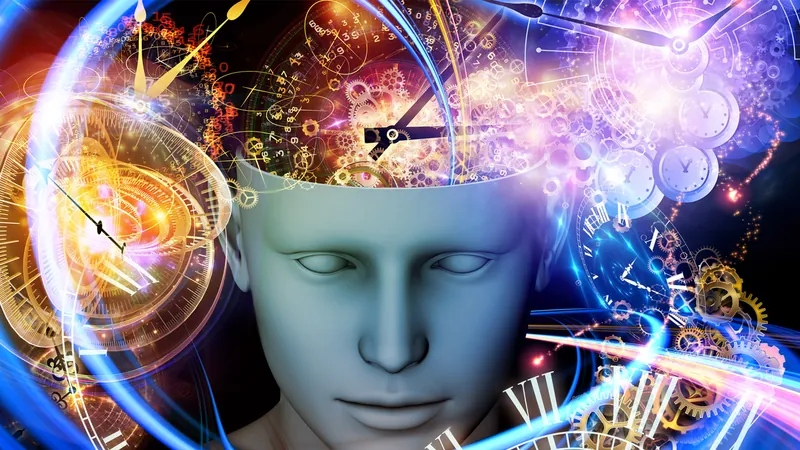
Unlocking the Secrets of Time: Psychologist Reveals We Can Slow Down Time with Our Minds!
2025-01-08
Author: Noah
Unlocking the Secrets of Time
In a groundbreaking revelation, psychologist Steve Taylor from Leeds Beckett University asserts that humans possess an extraordinary ability to alter their perception of time using nothing but the power of their minds. In his new book, intriguingly titled *Time Expansion Experiences: The Psychology of Time Perception and the Illusion of Linear Time*, Taylor dives deep into what he terms “time expansion experiences” (TEEs) and “time cessation experiences” (TCEs).
Understanding Time Expansion Experiences (TEEs) and Time Cessation Experiences (TCEs)
Taylor argues that these phenomena, where individuals feel as though time is either significantly slowed down or even completely halted, are remarkably positive experiences characterized by a sense of calm, clarity, and heightened awareness. According to Taylor, these experiences can frequently occur during high-stress situations or moments of intense focus, suggesting a complex interplay between our mental states and our sense of time.
The Subjective Nature of Time Perception
In an insightful article for *The Conversation*, Taylor explains, "Our subjective experience of time can vary dramatically based on our circumstances. For instance, a week spent exploring a distant land often feels longer than a week at home. Conversely, when we’re engaged in activities like playing music or painting, time appears to whiz by."
The Connection to Emergencies and Athlete Performance
Fascinatingly, Taylor notes that TEEs often manifest during emergencies—like car accidents or sudden falls. His research, published in the *Journal of Humanistic Psychology*, indicates that approximately 85% of people have experienced a TEE at least once, with about half occurring in high-pressure situations. Moreover, he highlights that athletes frequently encounter these altered states during critical moments in their performance, as do those under the influence of psychedelic substances like LSD or ayahuasca.
Possible Explanations for Time Expansion Experiences
But what drives these unique experiences? Taylor posits that one plausible explanation could relate to the release of noradrenaline in emergencies, a hormone associated with the ‘fight or flight’ response. However, this theory doesn’t account for the typically tranquil and positive feelings accompanying TEEs.
Another intriguing hypothesis Taylor explores suggests that TEEs may have evolutionary roots. Perhaps our ancestors developed the capability to slow down their perception of time during life-threatening situations—such as facing wild predators or environmental dangers—to sharpen their survival instincts. Yet, this theory raises similar questions regarding the non-emergency contexts in which TEEs often arise.
Lastly, Taylor speculates that TEEs might represent not real phenomena but rather illusions of recollection. In intense situations, our heightened awareness could lead us to absorb more sensory information than usual, creating vivid memories that give the impression of a prolonged experience of time when recalled later.
The Quest to Understand Time Perception
Ultimately, Taylor champions the idea that TEEs are not mere figments of the imagination but rather genuine altered states of consciousness. The intriguing question remains: Is it feasible to consciously manipulate our perception of time at will? Taylor is on a quest to unravel this captivating enigma, and the implications of his findings could revolutionize our understanding of time perception and enhance our experiences in everyday life.
Transforming Moments into Experiences
Could you imagine transforming mundane moments into profound experiences? Stay tuned as we explore the exciting possibilities of mastering time!



 Brasil (PT)
Brasil (PT)
 Canada (EN)
Canada (EN)
 Chile (ES)
Chile (ES)
 Česko (CS)
Česko (CS)
 대한민국 (KO)
대한민국 (KO)
 España (ES)
España (ES)
 France (FR)
France (FR)
 Hong Kong (EN)
Hong Kong (EN)
 Italia (IT)
Italia (IT)
 日本 (JA)
日本 (JA)
 Magyarország (HU)
Magyarország (HU)
 Norge (NO)
Norge (NO)
 Polska (PL)
Polska (PL)
 Schweiz (DE)
Schweiz (DE)
 Singapore (EN)
Singapore (EN)
 Sverige (SV)
Sverige (SV)
 Suomi (FI)
Suomi (FI)
 Türkiye (TR)
Türkiye (TR)
 الإمارات العربية المتحدة (AR)
الإمارات العربية المتحدة (AR)